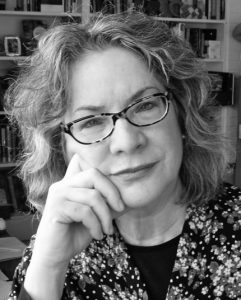Cornelia Maude Spelman is the author of the memoir Missing. She has worked as a therapist, and also has written the The Way I Feel series of children's books. She lives in the Chicago area.
Q: You begin your memoir focusing on your connection to New Yorker writer William Maxwell. How would you describe that dynamic, and what role did he play in encouraging you to write this book?
A: William Maxwell was 76 when I first met him, and I was 37. He seemed like the wise and beneficent father I did not have, and his gentleness and courtesy—as well as that of his wife, Emmy— touched me.
Because he had known my parents when they were young and full of life, he gave me the great gift of “seeing” them then, especially my mother, who he described as “more vivid than other girls—the way certain tropical birds are vivid,” such a contrast to my memories of her depressed, sad, and very ill from her deadly smoking.
Bill and I exchanged letters and I visited him a number of times over the years until his death at 92. When I had told him of my mother having been placed in a nursing home and kept there so that my father would be free to pursue her friend, Bill said, “I want you to write your mother’s story. It seems it would make it up, somehow, for what happened to her.”
Bill had wanted to hold on to his admiring memories of my father, but reluctantly had come to see my father more realistically.
I had been working on Missing for a very long time, researching, writing, and trying out different ways to focus the huge amount of material I had in my file drawers of family papers and from my research, and Bill’s encouragement to write had always been helpful to me.
I had once considered, and asked his permission to, write the book titled Dear Bill, thinking of it as a long letter explaining everything to him.
Q: How was the book's title chosen, and what does it signify for you?
A: I had a number of other different titles for my memoir before I settled on Missing as the most inclusive title, signifying not only what my mother, as a child, had missed when her father suddenly died, had missed because of her mother’s emotional coldness, but also because of my missing brother, and what I, too, had missed growing up with parents who, because of their own inadequate parents, were sometimes hurtful and neglectful.
Those titles included The Faint Sound of a Human Heart, My Mother’s Heart, The Night Train, and Lost and Found.
To help myself think about the title, I wrote a list of what I considered key words about the story: Heart, heartbroken, fix, rectify, put to rights, redress, discover, seek, turn up, uncover, bring to light, unearth, detect, track down, point to, put one’s finger on, discern, recover, recoup, get back, restore, save, rescue, reclaim, retrieve, buried, abandoned, gone, departed, irrecoverable, mislay, betray, part with, suffer the loss of, evade, escape, elude, missing.
Q: How would you describe your relationship with your mother?
A: My mother was benign—she didn’t criticize me or judge me—but she was emotionally absent.
Part of it was that she was depressed for many years, part of it was that she used alcohol and tranquilizers in addition to nicotine, part of it was, I believe, because when as a child her father had suddenly died, she had frozen a part of herself and that freeze kept her from being close to others.
She rarely hugged or touched me or my siblings, and seemed to find expression of feelings rather embarrassing. She was more like a friendly but remote aunt than an interested or attentive mother.
Having five children, when she would have been, really, so much better suited to being a writer or scholar, must have been exhausting and disappointing to her. She told me she had five children because she had been an only child and it had been lonely.
Q: The writer Margot Livesey said of you and the book, “I admire the honesty with which she allows herself to be a character in the story and the delicacy with which she treats the other members of her family.” What do you think of that description?
A: I appreciated Margot’s comment about my “honesty and delicacy” in writing about my family because I felt I had succeeded in my aim to write about painful and private family matters without maliciousness, and that I had succeeded in achieving a fair yet honest assessment of the reality of my family’s problems.
Q: What are you working on now?
A: I am presently working on a second memoir, and have written a children’s picture book that is of special importance to me, about how to know when things are true.
Q: Anything else we should know?
A: My website is www.corneliaspelman.com. I would be delighted to take part in any book club discussion or any other sort of discussion via Zoom; also, I am able to travel and appear in person if that would be possible.
--Interview with Deborah Kalb


No comments:
Post a Comment